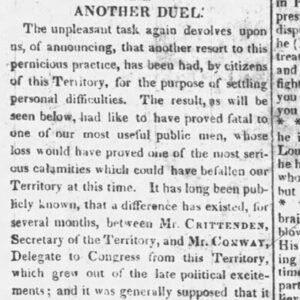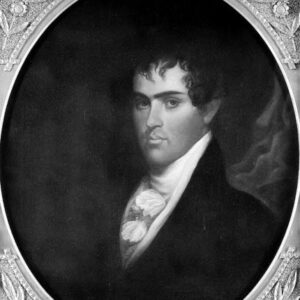calsfoundation@cals.org
Robert Crittenden (1797–1834)
Robert Crittenden was the first secretary and acting governor of the Arkansas Territory; subsequently, he was the first person to serve in the role now known as the lieutenant governor of Arkansas. He was a prominent member of the Arkansas bar, candidate for territorial delegate to Congress in 1833, and political powerbroker in territorial Arkansas.
Robert Crittenden was born on January 1, 1797, in Woodford County, Kentucky, near Versailles. He was the son of John Crittenden, a major in the Continental Army during the Revolutionary War and a member of the Virginia House of Burgesses, and Judith Harris. His brother, John Jordan Crittenden, served as a United States senator from Kentucky and was attorney general under presidents William Henry Harrison and Millard Fillmore.
Robert Crittenden received an education in law and practiced briefly with his brother in Kentucky. He entered the United States Army in 1814 and served as a commander of volunteers in the first Seminole War during 1817 and 1818.
President James Monroe appointed Crittenden first secretary of Arkansas Territory in 1819, in large part because of his brother’s influence. General James Miller, who was appointed to be the first governor, was delayed in coming to the state, so Crittenden served as acting governor from his appointment on March 3, 1819, and his arrival in the territory in June of that year, until December 26, when Governor Miller arrived. As acting governor, Crittenden began to carefully create a political faction loyal to him. During the six months before the arrival of the governor at Arkansas Post (Arkansas County), Crittenden appointed every official who could be appointed by the acting governor, including two superior court (now called Supreme Court) judges, the territorial auditor, and treasurer. He also declared Arkansas a territory of the second class, which allowed the establishment of its own legislature and judiciary. He set the election date of the legislature and judiciary to allow a minimum of campaigning and was able to elect most of the officials loyal to him, thus increasing his power and political prestige.
In 1820, Crittenden successfully used his power in helping urge the legislature to move the territorial capital from Arkansas Post to Little Rock (Pulaski County), where he owned, or controlled through preemption certificates, substantial land. From the beginning, Crittenden was a master politician and formed allegiances and groups of friends in the absence of defined political parties.
He was an early supporter of Henry W. Conway, who became a delegate to Congress from the territory in the election of 1823. Conway, a native of Tennessee, had come to the territory as the federal receiver of public monies and later became the Little Rock postmaster. Conway was the political public face, but Crittenden was the backstage commander. After a falling out with Conway over what Crittenden thought was a broken promise not to run for re-election in 1825, Crittenden supported Robert C. Oden, a Little Rock attorney, against Conway; however, Oden lost.
Soon after Little Rock became the territorial capital, effective June 1, 1820, Crittenden formed a law partnership with Chester Ashley, another political force in the territory, who also owned and controlled land in the Little Rock area, through preemption and other certificates issued by the federal government.
Crittenden married Ann Innis Morris on October 1, 1822, in Kentucky, and they had four children, one son and three daughters.
In 1824, Governor Miller resigned. Conway, now a delegate to Congress, recommended Crittenden for the post of governor. Instead, President James Monroe appointed George Izard of Pennsylvania as governor, leaving Crittenden as secretary of state. Despite the setback, Crittenden continued his behind-the-scenes influence of Arkansas politics. The naming of Crittenden County in 1825 reflects his prominence in the state.
In 1827, Crittenden perceived comments made by his old colleague, Conway, as criticism. He challenged Conway to a duel in which Conway was mortally wounded with the first shot, dying several days later. Ambrose H. Sevier was chosen in a special election to fill Conway’s seat as a delegate to Congress. Sevier was the speaker of the house in the territorial legislature and a supporter of Conway. The Conway family and Sevier formed a political alliance which kept Sevier in power as delegate to Congress until 1836 and, later, made him a U.S. senator. Ironically, Crittenden’s shooting of Conway paved the way for a powerful force in Arkansas politics opposed to Crittenden’s choices.
(The Crittenden-Conway duel was just one of many duels between Arkansas politicians and others over the years—a practice that did not end until 1863. One Kentucky newspaper opined that in Arkansas, if you could not beat a candidate at the polls, you could kill him in a duel.)
When Governor Izard died on November 22, 1828, Crittenden, who resented the repeated appointment of outsiders as head of the government of the territory he had come to call home, applied for the appointed job. However, President Andrew Jackson appointed his political ally, John Pope, governor in 1829. President Jackson’s appointment of Pope had less to do with Robert Crittenden’s shortcomings than his brother John’s opposition to Jackson’s election. President Jackson removed John Crittenden from his position as United States district attorney in Kentucky and Robert Crittenden from his position as secretary of state. Despite his removal, Crittenden continued his behind-the-scenes politics, being referred to by his former law partner, Chester Ashley, as the “Cardinal Wolsey” of Arkansas politics.
The 1830 federal census showed that Crittenden owned eight enslaved people.
In 1831, the federal government granted to the territory ten sections of land, which the territory was to sell to raise money for public buildings. Crittenden convinced the territorial legislature to authorize a trade of his home, which could become a public building, for the ten sections; however, Governor Pope vetoed the legislative authorization for the exchange. Within a few months, the ten sections were sold for approximately $30,000, and Crittenden sold his home for $6,700.
In the election of 1833, Crittenden attempted to unseat Sevier. Crittenden made Pope’s veto of his home trade the primary issue in the campaign, attempting vindication. Indicating their condemnation of Crittenden’s proposed swap, Sevier easily won the election. Crittenden’s control and influence on the political scene of Arkansas was in serious decline at that time. His lifelong attempt to support and control and then oppose political candidates had seriously weakened his influence, especially when pitted against the well-organized forces of the Conway-Sevier faction.
After the defeat, Crittenden continued to practice law. He collapsed and died on December 18, 1834, in Vicksburg, Mississippi, while arguing a case. While there is no certainty, it is believed he is buried in Vicksburg.
For additional information:
Bolton, S. Charles. Arkansas, 1800–1860: Remote and Restless. Fayetteville: University of Arkansas Press, 1998.
Newberry, Farrar. “Some Notes on Robert Crittenden.” Arkansas Historical Quarterly 16 (Autumn 1957): 243–256.
White, Lonnie J. “The Election of 1827 and the Conway-Crittenden Duel.” Arkansas Historical Quarterly 19 (Winter 1960): 293–313.
———. Politics on the Southwestern Frontier: Arkansas Territory, 1819–1836. Memphis: Memphis State University Press, 1964.
Allen W. Bird
Little Rock, Arkansas
This entry, originally published in Arkansas Biography: A Collection of Notable Lives, appears in the CALS Encyclopedia of Arkansas in an altered form. Arkansas Biography is available from the University of Arkansas Press.
 Louisiana Purchase through Early Statehood, 1803 through 1860
Louisiana Purchase through Early Statehood, 1803 through 1860 Politics and Government
Politics and Government Conway-Crittenden Duel Story
Conway-Crittenden Duel Story  Robert Crittenden
Robert Crittenden 




Comments
No comments on this entry yet.